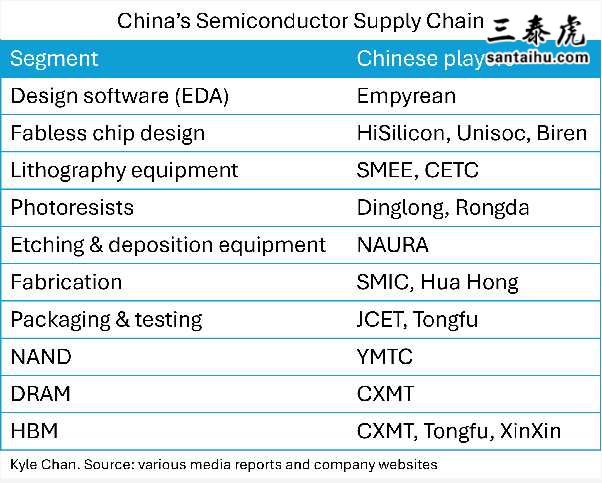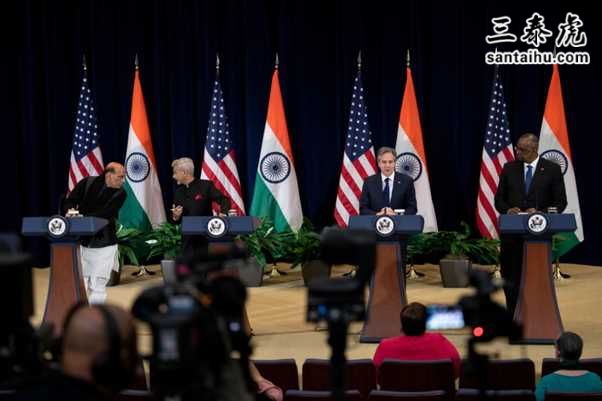Can India potentially produce its own semiconductors like China has done?
印度有没有可能像中国那样生产出自己的半导体呢?
以下是Quora读者的评论:
Roger Shepard
No.
A broader and more general question is being asked here.
“Does India have the capability of building and/or becoming the world center for globally significant technical endeavor(s)?”
Like China and its nuclear reactor(s), is India capable of develo various types of nuclear-powered electric generating systems and facilities, mass-constructing and deploying them?
Without question, the answer is no.
不。
这里提出的是一个更广泛、更普遍的问题。
“印度是否有能力成为在全球具有重大意义的世界技术中心呢?”
就像中国建造了自己的核反应堆,印度有没有能力研发出各类核能发电系统和设施,并大规模建造和部署它们呢?
毫无疑问,答案是否定的。
Bill Chen
Just to make chips? Sure. Even Singapore can do that.
But making chips the way China is pursuing? No.
Why?
就只是制造芯片吗?当然能做到。就连新加坡都能做到这一点。
但要像中国所追求的那种方式来制造芯片呢?做不到。
为什么呢?
If we think about it, there are 3 main bottlenecks in chipmaking, especially advanced chipmaking.
One. Specialized tools. These are mostly monopolized by the west today. There are several hundred processes that are run through separate machines to tap out a chip design made on specialized software. Throw in a sophisticated HVAC system for better than OR levels of hygiene.
Two. Very pure chemicals and raw materials. Chip-grade materials are next-level in terms of spec. Merely finding the equipment and expertise to certify the levels of purity demanded is a challenge.
Three. Engineering talent. A chip fab probably contains more post-graduates per capita than any other factory. Quite a number are phds with decades of experience. The machines and processes they operate are so complex that skills are not easily transferable along the same production line.
如果我们思考一下,在芯片制造,尤其是先进芯片制造方面,存在三个主要的瓶颈。
其一,专用工具。如今这些工具大多被西方所垄断。要做出一个在专业软件上设计好的芯片,需要通过数百道工序,而每道工序都要在不同的机器上完成。此外,还需要一套精密的暖通空调系统(HVAC),以达到比手术室(OR)还要高的卫生标准。
其二,高纯度的化学制品和原材料。芯片级别的材料在规格方面属于顶级水平。仅仅是找到能够检测所需纯度水平的设备和专业技术,就已经是一个挑战了。
其三,工程技术人才。一家芯片制造工厂里,人均拥有的研究生数量可能比其他任何工厂都要多。其中相当一部分是拥有数十年经验的博士。他们所操作的机器和工艺流程极其复杂,以至于在同一条生产线上,这些技能很难轻易转移。
At this point, no country has all three pieces of the puzzle. For example, taiwan has the talent, but depends on Japan for chemicals and the US and Europe for tools.
China will in the 2030s build a sufficiently complete and independent chip fabrication eco-system that is immune to sanction and blockade. It will be the first nation in the 21st century to own the tools, materials and talent necessary for domestic chip production from mature to cutting edge.
At this point, I don't think even the US at 30t gdp is capable of reaching china's goal.
目前,没有一个国家能同时具备这三个要素。例如,中国台湾地区拥有人才,但在化学制品方面依赖日本,在工具方面依赖美国和欧洲。
在21世纪30年代,中国将建立起一个足够完整且独立的芯片制造生态系统,可以免受制裁和封锁的影响。中国将成为21世纪第一个拥有从成熟到尖端的国内芯片生产所需的工具、材料和人才的国家。

就目前而言,我认为即便是GDP达到30万亿美元的美国,也无法实现中国的这一目标。
Kanthaswamy Balasubramaniam
India has three fatal problems:-
Unwilling to work hard or sacrifice to achieve results
Unwilling to accept mistakes and criticism and becoming defensive
Unwilling to learn
China score top points in all the three key areas
Chinese sacrificed two generations to build their country, work as hard as possible and build a unity that worked for them
Their leaders weren't gutter corrupt and they did not have industrialists exploiting the system to get rich all the time
印度存在三个致命问题:
- 不愿为取得成果而努力工作或做出牺牲;
- 不愿接受错误和批评,且总是采取防御态度;
- 不愿学习。
中国在这三个关键方面都表现出色。



中国人牺牲了两代人的努力,建设自己的国家,并建立起了一种对他们有益的团结精神。
中国的领导人没有贪污腐败的行为,也没有一直利用体制来发财的实业家。
The Chinese bent their knee to the Japanese and learnt a lot from them, putting BUSINESS before everything else
From factory organization to supply chains to electronics to high speed rail
India is the exact opposite
Indians are disinclined to hard work and sacrifice
That's because Indian leaders are GUTTER CORRUPT and Industrialists are exploitative and predatory
So the average Indian is not inclined to work hard and sacrifice a generation because such hard work and sacrifice would never be recognized but only exploited
Indians are also UNWILLING TO LEARN
中国人曾向日本人学习,并且从他们那里学到了很多东西,把商业置于一切之上。
从工厂组织到供应链,再到电子产业以及高铁领域(都有体现)。
而印度则恰恰相反。
印度人不愿意努力工作和做出牺牲。
这是因为印度的领导人极其腐败,实业家们也极具剥削性和掠夺性。
所以普通的印度人不愿意努力工作,也不愿意牺牲一代人的利益,因为这样的努力和牺牲永远不会得到认可,而只会被剥削。
印度人同样也不愿意学习。
India could have invited the Chinese ten times by now and built joint ventures and learnt more on batteries and solar cells and key technologies
Instead India due to ego and stupidity learns nothing and is disinclined to learn
So India TALKS…
Talks, Talks, Talks, Talks and Talks all the time
Talking, Bragging, Lying and Talking some more
Always portraying a devastating and disastrous optimism and having a KOLLYWOOD frame of mind where success happens like Annamalai (1992) or Suryavansam (1997)
到现在,印度本可以邀请中国人十次,建立合资企业,并在电池、太阳能电池以及关键技术方面学到更多东西。
然而,由于自负和愚蠢,印度什么都没学到,也不愿意去学习。
所以印度人只会……
一直说、说、说、说、说。
夸夸其谈、吹嘘、撒谎,然后继续说。
总是表现出一种毁灭性且灾难性的乐观态度,还怀着一种宝莱坞式的心态,认为成功就像电影《阿纳马莱》(1992年)或《太阳王朝》(1997年)里那样轻易就能实现。
So now Semiconductors
How many trained skilled Engineers?
How many trained Skilled Non Engineering Personnel?
How much water is available ?
How much power is available?
How is the local demand for semiconductors?
Who provides the mother machines necessary? China. Would China provide mother machines for India? No. So who else can provide affordable mother machines
Who will fund and subsidise the money for this? India pays 27% of its expenditure to pay interests already
So let India commercially make semiconductors and let's see with our own eyes and then let us talk
I am tired of Indian failures all the time
那么现在来说说半导体领域。
- 有多少经过培训的熟练工程师?
- 有多少经过培训的熟练非工程人员?
- 有多少可用水资源?
- 有多少可用电力资源?
- 当地对半导体的需求情况如何?
- 谁能提供必要的母机(核心设备)呢?是中国。中国会给印度提供母机吗?不会。那么还有谁能提供价格合理的母机呢?
- 谁会为这个项目提供资金和补贴呢?印度已经要将其支出的27%用于支付利息了。
所以,就让印度在商业层面上去制造半导体吧,然后我们拭目以待,到时候再谈。
我已经对印度一直以来的失败感到厌烦了。
Yi Li
I don't think India can.
Firstly, the semiconductor industry demands substantial capital investment, competitive remuneration for R&D personnel, high - quality raw and auxliary materials, and a favorable operating environment. Even if Western capital is interested in investing in India, the country's dilapidated infrastructure, poor logistics services, and inefficient government pose significant obstacles. And the lack of clear returns on investment is another major concern. If India aims for self - reliance and intends to invest large sums on its own, its current financial capabilities simply fall short.
我认为印度发展不来半导体产业。
首先,半导体产业需要大量的资本投入、为研发人员提供有竞争力的薪酬待遇、高质量的原辅材料以及良好的运营环境。即便西方资本有兴趣在印度投资,该国破旧的基础设施、糟糕的物流服务以及效率低下的政府都构成了重大障碍。而且投资缺乏明确的回报是另一个主要问题。如果印度想要实现自给自足并打算自行投入大量资金,就其目前的财政能力而言,根本是力不从心。
Secondly, the semiconductor industry has a high demand and requirement for water resources. To produce a 12-inch wafer, the entire process requires roughly 8 tonnes of water. Global semiconductor manufacturers consume water, equivalent to the water consumption of a city in Hong Kong, India is one of the world's most water-poor countries, how can afford it? In addition, the semiconductor industry on the processing of chips of ultrapure water requirements are very high, need to achieve 18.2 megohm - cm resistivity (almost no impurities), which for India's current water treatment technology, is a big problem. Besides, the semiconductor industry also requires high power security at the factory site, and India's power supply has always been in short supply.
其次,半导体产业对水资源的需求和要求都很高。生产一片12英寸的晶圆,整个过程大约需要8吨水。全球半导体制造商的耗水量相当于一座香港城市的用水量,而印度是世界上水资源最为匮乏的国家之一,怎么能负担得起呢?此外,半导体产业对芯片加工所需的超纯水要求非常高,需要达到18.2兆欧·厘米的电阻率,这对于印度目前的水处理技术来说,是一个大难题。除此之外,半导体产业还需要工厂所在地具备较高的电力保障,而印度的电力供应一直都处于短缺状态。
Finally, almost all of India's various diplomatic actions stem from the backdrop of the tech war that has erupted between the US and China since 2018, when the US cut off supplies to ZTE and sanctioned Huawei. India is obviously keen to profit from the US-China tech war. And the United States also hopes to counterbalance China by pulling India in. But in reality, the semiconductor diplomacy between the two countries so far are only in the government consensus and academic seminars, far from the actual input!
最后,几乎印度的所有外交行动都源于自2018年以来中美之间爆发的科技战争这一背景,当时美国切断了对中兴的供应并制裁了华为。印度显然热衷于从中美科技战争中获利。而美国也希望通过拉拢印度来制衡中国。但实际上,到目前为止,两国之间在半导体领域的外交行动仅仅停留在政府层面的共识和学术研讨会上,远远没有落实到实际投入中!

Karthik Bala
Someone always foots the bill for any major transformation
It's like when the husband wants to go to medical school and later do a fellowship to earn a million dollars a year. This will take four years for med school, four of internship and residency and three of fellowship which is eleven years
Who pays the bills for these eleven years?
Either an understanding wife who works triple shifts to run the house or a rich father or a group of relatives who between them keep the bills going
Kee the technical stuff out because I am unfamiliar with the technical capabilities of the indian workforce :-
For India to foray into semiconductors , experts estimate they need twenty years to develop a grid supply chain and another ten more to develop an ecosystem or hub
任何重大变革总是需要有人来承担改革的费用。
这就好比丈夫想要去读医学院,然后再参加专科培训,这样以后每年能挣一百万美元。读医学院需要四年时间,实习和住院医师培训要四年,专科培训还得三年,总共就是十一年。
那么这十一年的费用由谁来支付呢?
要么是一位善解人意、打三份工来维持家庭开销的妻子,要么是一位富有的父亲,或者是一群亲戚共同承担这些费用。
先不讨论技术方面的问题,毕竟我对印度劳动力的技术能力并不熟悉:
要让印度涉足半导体领域,专家估计他们需要二十年时间来建立一个完整的供应链,还需要再花十年时间来打造一个生态系统或产业中心。
Only then can India make low cost semiconductors on a scale to deliver enough profit to negate any demand for imports
So I won't dwell into the technical possibilities.
Assuming India had the technical skill, the question remains
Who foots the bill for thirty years?
The Americans have their own ecosystem and profits that can foot the bill for next generation investment
The Chinese have their government and their state funding
India needs someone to pay the bills
只有到那时,印度才能够大规模生产低成本的半导体,获得足够的利润,从而减少对进口的需求。
我就不深入探讨技术上的可能性了。
假设印度具备了技术能力,问题依然存在:
谁来承担这三十年的费用呢?
美国人拥有自己的产业生态系统和利润,足以支撑对下一代半导体产业的投资。
中国人有政府和国家资金支持。
印度则需要有人来支付这笔费用。
Either the financial system - through zero interest loans or long term debt for retail investors
Through Government funding
Through Private Funding by interested business groups like Electronics or Automobile industrialists
If you can find someone who doesn't mind paying the bills for thirty years - you can become make semiconductors like China
If your people work like the Chinese people, like drones , all day, every day
If your tertiary education infrastructure can train them at lowest cost to maxmum ability
Can you guys do all this?
I can't say. You know better.
要么是金融系统——通过向零售投资者提供零利率贷款或长期债务的方式;
要么依靠政府资金;
要么由电子或汽车行业的实业家这样有兴趣的商业团体提供私人资金。
如果你能找到某个不介意支付三十年费用的人或团体——那么你就可以像中国那样发展半导体产业了。
如果你国家的人民能像中国人那样,不知疲倦的,每天从早到晚地工作;
如果你的高等教育基础设施能够以最低的成本将他们培养到最大限度的能力水平。
你们能做到这些吗?
我不好说。你们自己更清楚。
此文由 三泰虎 编辑,未经允许不得转载!:首页 > 印度人看中国 » 印度有没有可能像中国那样生产出自己的半导体,中国会成为全球第一个建立完整芯片制造生态系统的国家